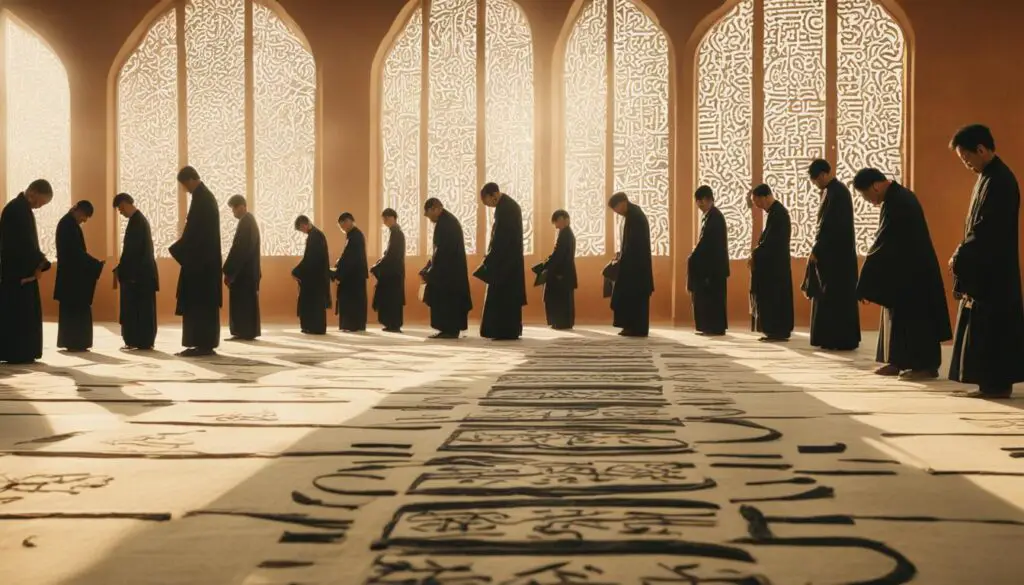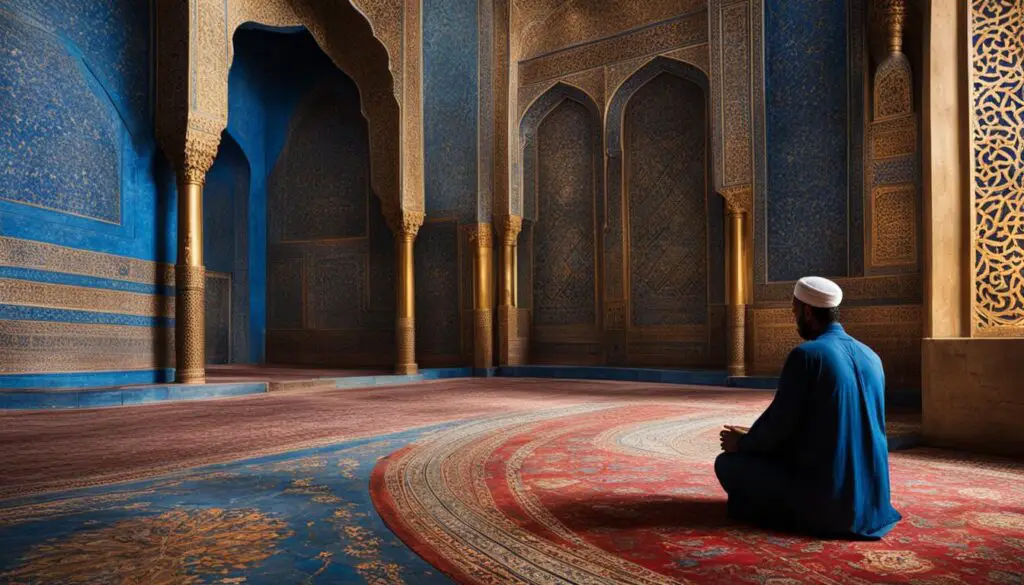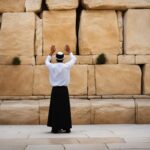The history of prayer in Islam is a profound and integral part of the Islamic faith. It plays a pivotal role in the spiritual journey of Muslims and has evolved over time. Understanding the origins and evolution of prayer in Islam provides insights into its significance and practices.
Key Takeaways
- Prayer in Islam has a rich history that spans centuries.
- It is an integral part of the Islamic faith and holds great significance for Muslims.
- Islamic prayer has its origins in the teachings of Prophet Muhammad.
- Over time, prayer in Islam has evolved in terms of its rituals and practices.
- Prayer is a spiritual journey that connects Muslims with Allah and provides inner peace.
Significance of Prayer in Islam
Prayer holds great significance in Islam, as it is one of the Five Pillars of Islam. Muslims believe that prayer connects them with Allah and provides them with spiritual nourishment. It is a means of expressing devotion, seeking guidance, and finding inner peace.
Islamic prayer practices involve physical movements, recitation of verses from the Qur’an, and supplication to Allah. These practices create a sense of unity and discipline among Muslims, fostering a collective bond of faith and devotion.

Through prayer, Muslims engage in a direct relationship with Allah, seeking His forgiveness, blessings, and guidance. The act of prayer serves as a reminder of their submission to Allah’s will and an opportunity to seek spiritual fulfillment.
“Prayer is not asking. It is a longing of the soul. It is daily admission of one’s weakness. It is better in prayer to have a heart without words than words without a heart.” – Mahatma Gandhi
Islamic prayer rituals encompass various aspects, including physical and spiritual purification, specific postures, and the recitation of verses from the Qur’an. These rituals instill mindfulness, humility, and reverence in the hearts of believers.
The Elements of Islamic Prayer
- Physical Movements: Muslims perform prayer in a series of postures, including standing, bowing, prostrating, and sitting. These physical movements symbolize humility, surrender, and devotion to Allah.
- Recitation of Verses: During prayer, Muslims recite verses from the Qur’an, the holy book of Islam. These verses serve as a means of connecting with Allah and seeking His blessings and guidance.
- Supplication to Allah: Muslims also engage in supplication, expressing their personal needs, desires, and gratitude to Allah. It is an intimate moment of communication between the believer and the Creator.
Overall, prayer in Islam holds immense significance in the lives of Muslims. It serves as a constant reminder of their faith, fosters a sense of unity within the Muslim community, and provides a means of seeking spiritual growth and guidance.
Origins of Islamic Prayer
The origins of Islamic prayer can be traced back to the teachings of Prophet Muhammad, who received revelations from Allah. These teachings, known as the Qur’an, serve as the foundation for Islamic prayer practices. Prayer, or Salah, is a specific form of worship that was prescribed by Allah through the Qur’an.
During the early development of the Islamic faith, prayer played a central role in the lives of Muslims. As the Islamic civilization began to flourish, prayer became an integral part of everyday life and a means of connecting with Allah. The historical context of prayer in Islam encompasses the early struggles of the Muslim community and the establishment of prayer as a core component of Muslim worship.
“Verily, I am Allah: there is no god but I: so serve thou Me (only), and establish regular prayer for celebrating My praise.”
– Qur’an 20:14
The historical context provides valuable insights into the significance and practices of Islamic prayer. It highlights the profound devotion of Muslims towards Allah and their continuous efforts to seek His guidance and blessings through prayer.

Evolution of Prayer in Islam
Prayer in Islam has undergone a remarkable evolution throughout its history, adapting to the changing needs and practices of Muslims. The early Muslims looked to the Prophet Muhammad as their guide, following his example in performing the prayers. These practices were then transmitted from one generation to another, solidifying the foundation of Islamic prayer.
As Islamic civilization expanded and encountered diverse cultures, prayer rituals began to standardize, while still allowing for variations based on regional customs and traditions. This standardization contributed to the development of different schools of thought within Islam, each with its own nuanced approach to prayer.
“Prayer is the key to Heaven, but faith unlocks the door.” – Muhammad Ali
This evolution of prayer in Islam can also be observed in the compilation of prayer manuals and the establishment of prayer times and formats. Islamic scholars and jurists played a crucial role in refining the practices of prayer and providing guidance to the Muslim community.

Furthermore, the technological advancements in recent times have influenced the way Muslims engage with prayer. Mobile applications and online platforms provide resources and reminders for prayer times, ensuring that Muslims can fulfill their religious obligations wherever they may be.
| Era | Key Developments |
|---|---|
| Early Period | – Following the example of Prophet Muhammad – Regional variations in prayer practices |
| Expansion of Islam | – Standardization of prayer rituals – Development of different schools of thought |
| Modern Era | – Compilation of prayer manuals – Technological advancements in prayer reminders |
This ongoing evolution of prayer in Islam reflects the dynamic nature of the Islamic faith and its ability to adapt to the changing times and contexts. Despite the variations in rituals and practices, the core purpose of prayer remains the same – to establish a deep connection with Allah and seek spiritual fulfillment.
Islamic Prayer Rituals and Practices
Islamic prayer rituals, also known as Salah, are an integral part of the Islamic faith. They encompass specific physical movements, recitation of verses from the Qur’an, and supplication to Allah. These rituals hold deep spiritual significance for Muslims around the world.
Salah, the five daily prayers, is a mandatory practice for all Muslims. These prayers are performed at specific times of the day and involve various postures, including:
- Standing
- Bowing
- Prostrating
- Sitting
Muslim prayer practices place great emphasis on purity, humility, and focus. The act of performing Salah brings individuals closer to Allah and provides a sense of spiritual connection.

“Prayer is not asking. It is a longing of the soul. It is daily admission of one’s weakness. It is better in prayer to have a heart without words than words without a heart.” – Mahatma Gandhi
The Spiritual Journey of Prayer
Prayer in Islam is not just a physical act, but also a spiritual journey. It is a means of connecting with Allah, seeking forgiveness, and finding spiritual nourishment. Through prayer, Muslims strive for spiritual growth, self-reflection, and a deeper relationship with Allah.
Prayer provides a unique opportunity for Muslims to detach themselves from worldly distractions and focus their hearts and minds on the divine. It serves as a moment of solitude and introspection, allowing individuals to reflect on their actions, seek forgiveness for their shortcomings, and express gratitude for the blessings bestowed upon them.
A profound sense of awe and humility emerges as Muslims stand before Allah, acknowledging their complete dependence on Him and recognizing His infinite power and mercy. Prayer is a reminder of the transient nature of life and the ultimate purpose of existence: to worship and submit to the will of Allah.
Furthermore, prayer is not limited to individual devotion but also extends to communal worship. Muslims join together in congregational prayers, uniting their voices, souls, and aspirations as they collectively seek Allah’s guidance, mercy, and blessings.
“Verily, Salah prevents immorality and wrongdoing, and the remembrance of Allah is greater. And Allah knows what you do.” – Qur’an 29:45
As Muslims engage in the spiritual journey of prayer, they experience a profound sense of peace, solace, and connection. It is a transformative experience that nourishes the soul and strengthens the bond between the individual and their Creator.

| Key Aspects | Benefits |
|---|---|
| Self-reflection | Enhanced self-awareness and personal growth |
| Seeking forgiveness | Relief from guilt and a sense of spiritual purification |
| Gratitude | Increased mindfulness and appreciation for blessings |
| Connection with Allah | Strengthened relationship and sense of divine presence |
| Community worship | Unity, solidarity, and a sense of belonging |
The spiritual journey of prayer in Islam encompasses both the individual and the collective, serving as a transformative practice that guides Muslims towards a deeper understanding of themselves and their purpose in the world.
The Role of Prayer in Mental Health
The practice of prayer in Islam has been recognized for its potential benefits to mental health. Studies have shown that prayer can help reduce stress, anxiety, and depression. The act of submission to Allah and the focus on spiritual connection provide a sense of peace and inner calm.
Integrating prayer into mental health interventions can be beneficial, especially for Muslim patients. By incorporating Salah, the Islamic prayer, into therapy sessions, individuals can harness the power of prayer to promote emotional well-being and resilience. The rhythmic movements, recitation of sacred verses, and mindfulness inherent in Salah create a meditative state that calms the mind and alleviates psychological distress.
“Prayer is the key to a peaceful soul. It allows us to surrender our worries to a higher power and find solace in our faith.”
Furthermore, the communal aspect of prayer in Islam fosters a sense of belonging and social support, which are vital for maintaining mental health. Praying together in mosques and engaging in spiritual conversations with fellow believers can alleviate feelings of isolation and provide a supportive network of individuals who share similar values and experiences.
Incorporating prayer into mental health practices not only acknowledges the significance of faith in the lives of Muslim individuals but also taps into the holistic nature of mental wellness. By addressing the spiritual dimension of well-being along with psychological and physical aspects, professionals can provide comprehensive care that resonates deeply with Muslim patients.
| Benefits of Prayer in Mental Health | How Salah Promotes Mental Well-being |
|---|---|
| Reduces stress and anxiety | Offers a sense of peace and calm |
| Alleviates symptoms of depression | Provides solace and hope |
| Promotes mindfulness and self-reflection | Encourages self-awareness and personal growth |
| Creates a sense of community and social support | Fosters belonging and connection |
The potential benefits of incorporating prayer into mental health interventions extend beyond the individual level. By recognizing the role of spirituality, including the practice of prayer, therapists can enhance cultural competency and improve therapeutic outcomes for Muslim patients.
Prayer as a Universal Language of Faith
Prayer is not exclusive to Islam, but a universal language of faith. It is a common practice in many religions and cultures worldwide. Prayer serves as a means of communication with the divine, reflecting the universal human need for spirituality.
The significance of prayer in Islam is rooted in its ability to transcend cultural and linguistic barriers, connecting believers to Allah. It is a powerful act of devotion that enables Muslims to express their faith, seek guidance, and find solace in the presence of Allah.
“Prayer is the key with which we connect to the divine, regardless of our language or cultural background. It unites believers and reminds us of our shared humanity.”
Through prayer, Muslims find a sense of peace, purpose, and inner strength. It is a source of comfort amidst life’s challenges and a means of seeking forgiveness, guidance, and blessings from Allah. Islamic prayer rituals, with their specific movements, recitations, and supplications, provide a structured framework for believers to connect with the divine.
Prayer as a Bridge across Cultures
Prayer has the unique ability to transcend cultural boundaries and foster understanding and empathy among people of different backgrounds. It serves as a unifying force, reminding us of our shared values and aspirations.
Regardless of the language or form, prayer reflects mankind’s innate desire to connect with something greater than ourselves. It speaks to the universal human need for spiritual nourishment, guidance, and solace.
Prayer: Strengthening Interfaith Relationships
The practice of prayer also plays a vital role in building interfaith relationships and fostering mutual respect and appreciation among diverse religious communities.
When individuals from different faith traditions come together in prayer, they recognize their shared humanity and the common ground they stand on. This shared experience helps break down barriers and cultivate meaningful relationships characterized by respect, understanding, and collaboration.
As Muslims engage in prayer alongside individuals of different faiths, they showcase the beauty and richness of Islamic traditions, promoting harmony and unity in a diverse world.
The Power of Prayer: A Universal Connection
Prayer is a profound expression of faith that transcends the boundaries of language, culture, and time. It brings together individuals from all walks of life, providing a universal connection to the divine.
The significance of prayer in Islam lies not only in its historical and cultural context but in its ability to bridge gaps and foster unity among humanity. It serves as a reminder of our shared spiritual journey and the universal essence of faith.
| Prayer in Islam | Prayer in Other Religions |
|---|---|
| Offers a direct connection to Allah | Provides a means of communication with the divine |
| Includes specific physical movements and recitations from the Qur’an | Varies in form and content depending on the religious tradition |
| Emphasizes purity, humility, and focus | Encourages sincerity and devotion |
| An integral part of Muslim worship | Central to the spiritual practices of other faiths |
Conclusion
The rich history of Islamic prayer is a testament to its enduring significance in the Islamic faith. From its origins in the teachings of Prophet Muhammad to its evolution and practices, prayer holds a central place in the lives of Muslims worldwide. Understanding the history of prayer in Islam provides invaluable insights into the spiritual journey of Muslims and the deep-rooted importance of prayer in their daily lives.
Islamic prayer, stemming from the teachings of Prophet Muhammad, has been practiced for centuries. It serves as a means of connecting with Allah, seeking guidance, and finding inner peace. The rituals and practices of prayer, known as Salah, involve physical movements, recitation of verses from the Qur’an, and supplication to Allah. It is through prayer that Muslims express their devotion, seek spiritual nourishment, and strive for a deeper relationship with Allah.
As prayer in Islam has evolved over time, it has become a universal language of faith, transcending cultural and linguistic barriers. Prayer is a common practice in many religions and cultures around the world, reflecting the universal human need for spirituality. In Islam, prayer holds a central place in the lives of Muslims, serving as a constant reminder of their connection with Allah and their commitment to the Islamic faith.
By understanding the history and practices of Islamic prayer, we gain a deeper appreciation for its role in the lives of Muslims throughout history. It is through prayer that Muslims find solace, seek forgiveness, and strive for spiritual growth. The rich tapestry of Islamic prayer history continues to inspire and enlighten, serving as a guiding force for Muslims on their spiritual journey.
FAQ
What is the significance of prayer in Islam?
Prayer holds great significance in Islam as it is one of the Five Pillars of Islam. It connects Muslims with Allah, providing spiritual nourishment, devotion, guidance, and inner peace.
What are the origins of Islamic prayer?
Islamic prayer, known as Salah, has its origins in the teachings of Prophet Muhammad, who received revelations from Allah. The specific form of prayer was prescribed through the Qur’an.
How has prayer in Islam evolved over time?
Prayer in Islam has evolved in terms of rituals and practices. Early Muslims followed the example of Prophet Muhammad, and as Islamic civilization spread, standardized prayer rituals developed, leading to different schools of thought.
What are the Islamic prayer rituals and practices?
Islamic prayer rituals involve physical movements, recitation of verses from the Qur’an, and supplication to Allah. The five daily prayers, known as Salah, are mandatory for all Muslims and involve specific postures and times of the day.
What is the spiritual journey of prayer in Islam?
Prayer in Islam is a means of connecting with Allah, seeking forgiveness, and finding spiritual nourishment. It involves individual devotion and communal worship, striving for spiritual growth, self-reflection, and a deeper relationship with Allah.
What is the role of prayer in mental health?
Prayer in Islam has been recognized for benefiting mental health by reducing stress, anxiety, and depression. It provides a sense of peace and inner calm, making it beneficial to integrate prayer into mental health interventions.
Is prayer exclusive to Islam?
No, prayer is a universal language of faith and is practiced in many religions and cultures worldwide. It serves as a means of communication with the divine, reflecting the universal human need for spirituality.









